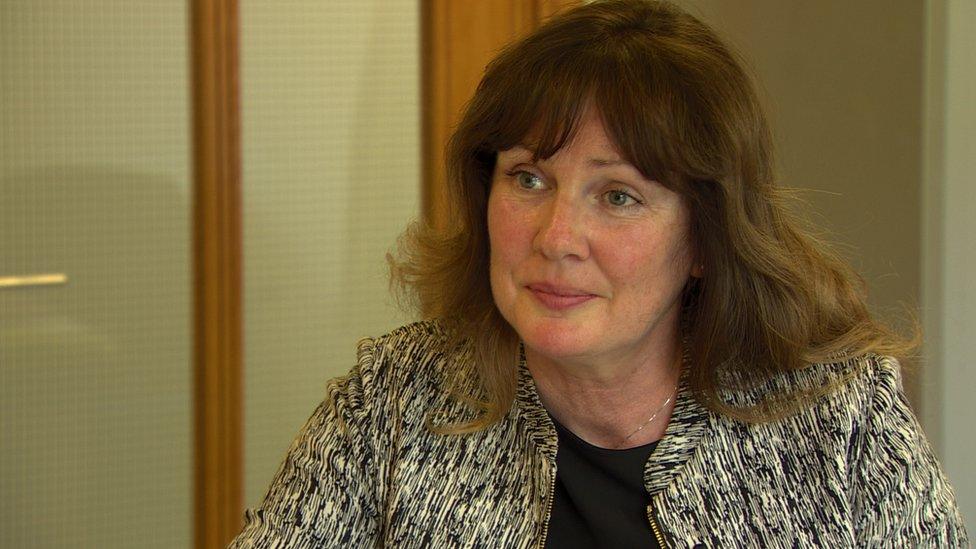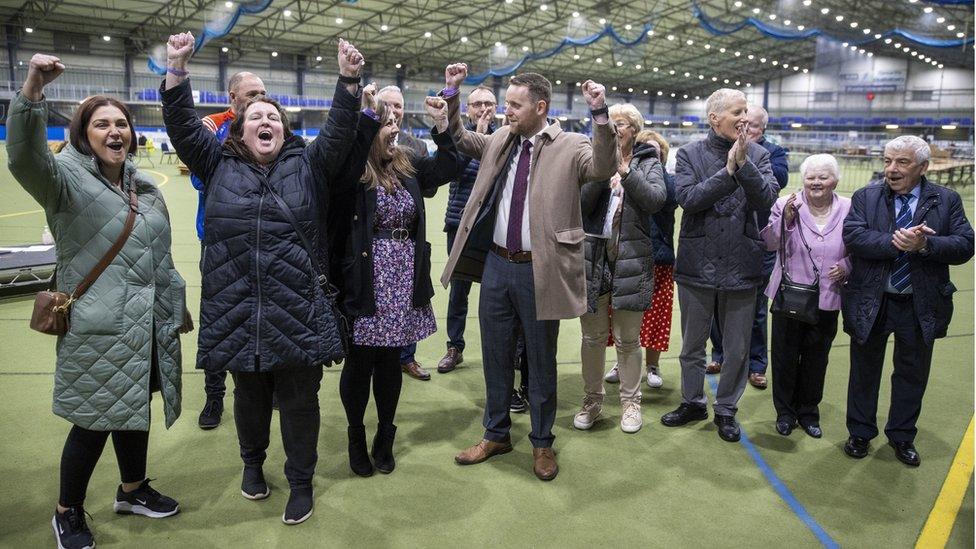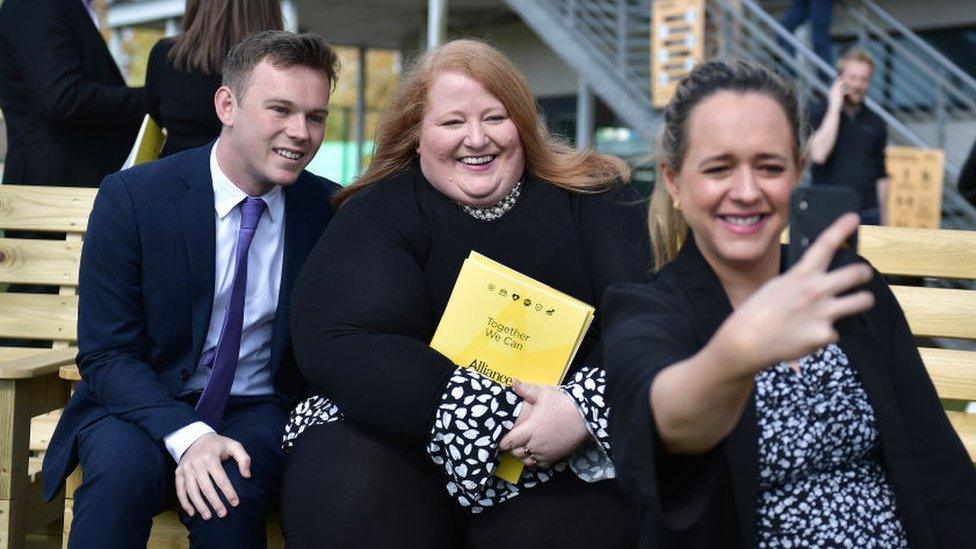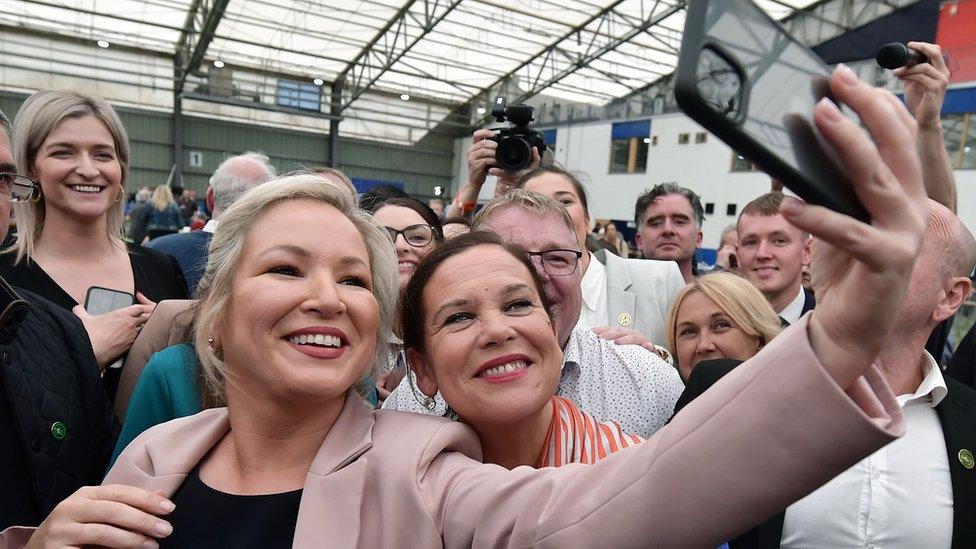NI election 2022: Why did the count take so long?
- Published

Magherafelt was one of three centralised count centres and it was last to complete its declarations
If you stayed up until the early hours of Sunday to watch the battle for the final seat at Stormont, you may have wondered why the process took so long.
Counting began at 08:00 BST on Friday but it was after 01:00 on Sunday - 41 hours later - when the DUP's Gary Middleton claimed the 90th seat.
Compare that to the 2017 assembly poll when all 90 seats were allocated within 19 hours of ballot boxes being opened.
However this time around, according to Northern Ireland's chief electoral officer, Covid-19, staff turnover and the complexities of Northern Ireland's voting system affected the speed of the count
Virginia McVea told BBC News NI her staff did a tremendous job and that she was not concerned about the speed of counting.
She said election authorities across the UK had found it more difficult than usual to recruit and retain experienced staff because of coronavirus concerns.

Virginia McVea praised election workers for how they handled the count during a pandemic
Ms McVea added there was a 25% drop-out rate among volunteers in Northern Ireland after the government decided there would be no coronavirus-related changes to the postal and proxy vote system.
This meant people who tested positive for Covid-19 were still allowed to vote in person.
She recalled speaking to an older man who "was torn, having worked in elections in his community for more than 50 years".
"He said he was scared to get Covid but his real concern was for his 90 plus-year-old mother if he, as her main carer, had to self-isolate.
"We at the Electoral Office understood that this was a hard decision for many."
'Strict rules' of the single transferable vote
The loss of veteran volunteers also meant new responsibilities passed to less experienced election workers, but Ms McVea praised their willingness to "take on jobs they had not done before".
Ultimately, though, she said the main reason for the long count was it was simply a much tighter race between many candidates in the latter stages.
This brought the complexities of Northern Ireland's single transferable vote (STV) system into play.
"It's just how the votes fell this time," Ms McVea said.
In STV, voters rank candidates down the ballot paper with their vote then being transferred when candidates are elected or eliminated.
Transfers are all-important here.
Candidates who secure a high number of first preference votes, but who are not transfer-friendly, often have to watch as rival candidates slowly chip away at their lead, overtaking them in the later stages.

The DUP's Gary Middleton (centre) won the last seat at Stormont on Sunday morning
In this election, several hopefuls did not reach the quota to be elected but too few votes separated them from their nearest rivals - so no-one could be excluded and the count had to go on to further stages.
Ms McVea said the system, underpinned by a complex mathematical process, is "brilliant in terms of giving people more of a say" but also has "very strict rules", which her staff had to adhere to when deciding when to eliminate candidates and distribute their transfers.
'Slow exclusions'
Five years ago, counting continued overnight on the first day until Claire Bailey of the Green Party claimed the final seat just after 03:00 on the Saturday morning.
Ms McVea, who decided against an overnight count last Friday evening, said this was "a very different vote" to the last assembly election.
"In 2017, we saw unprecedented numbers of exclusions at stages, helping the count move rapidly on.
"In 2022, we had a much closer run through many stages, with slow exclusions and reaching quota."
Although Foyle did not have the biggest number of candidates, the constituency was the last to declare all its seats, and the public vented their frustration with memes on social media.
Allow X content?
This article contains content provided by X. We ask for your permission before anything is loaded, as they may be using cookies and other technologies. You may want to read X’s cookie policy, external and privacy policy, external before accepting. To view this content choose ‘accept and continue’.

Ms McVea said shortly after the Foyle boxes were opened, it was clear to experienced election veterans it would be a long, complicated count due to the spread of votes.
In the end, just 95 votes separated Mr Middleton from his Ulster Unionist Party rival Ryan McCready, allowing the DUP man to narrowly keep his seat.
Queuing in the rain
It was a long couple of days for candidates, supporters, election staff and media covering the count - and there was also some frustration over the availability of food.
The counting process was spread across three centres - a much smaller number than usual - with ballot boxes taken to locations in Belfast, Jordanstown and Magherafelt.

Sinn Féin assembly member Deirdre Hargey joined the coffee queue on Friday morning
On Friday morning, a catering service in Belfast's Titanic Exhibition Centre did not open when expected, meaning people at the count, including candidates, had to queue in the rain for hot drinks.
"It was disappointing not to have the catering in place as planned at the start and I apologised to all staff, candidates and agents.
"The team at Titanic moved to get in support from their other sites as quickly as they could," said Ms McVea, adding that the service was in place by Friday afternoon.
Election staff are very restricted in where they can go during the count because of the need to maintain its integrity, but the chief electoral officer said that was taken into consideration.
"Staff are told in recruitment processes to bring plenty of food and drink and we try to keep an eye that everyone is ok."
Ms McVea said she knew this particular poll would be a challenge and she paid tribute to election staff who worked into the early hours to uphold the democratic process.
"I am so grateful to the people of Northern Ireland who came out to make this election happen during a pandemic, knowing that people with Covid would be allowed to enter polling stations and the count," she said.
"I am very pleased with how all those paid volunteers worked with our hugely experienced leadership team to bring the election reliably to completion."

NI ELECTION COUNT:The results in maps and charts
WHAT HAPPENS NOW? What does Sinn Féin's vote success mean?
THE ASSEMBLY: How power-sharing works in Northern Ireland

Related topics
- Published9 May 2022

- Published8 May 2022
